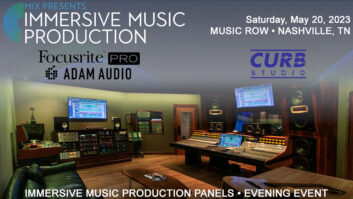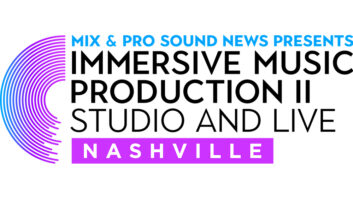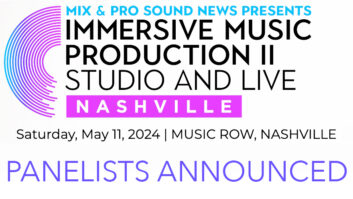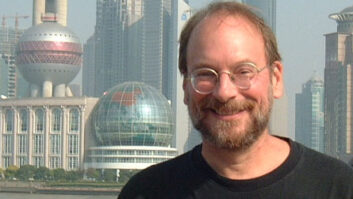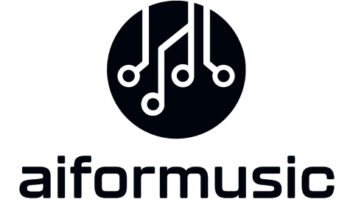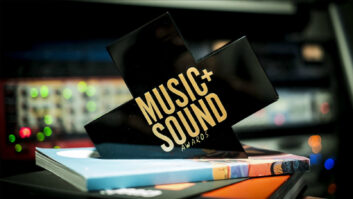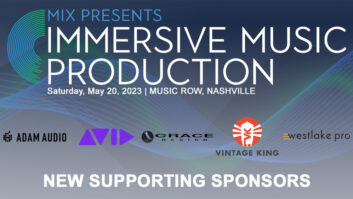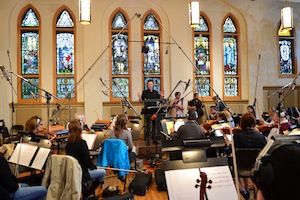
Composer Jason Graves conducting the Nashville Music Scoring Orchestra in Ocean Way Nashville’s Studio A for a Sony PlayStation videogame.
Photo: Emily Collins
The first thing anybody in recording talks about when they talk about Nashville is the players. The pickers, the A-list session players, the speed and brilliance. Next comes the studios, with the tradition-rich rooms, the amazing gear, and the incredible engineering talent. But for all the talk over the past 50-plus years about Nashville being a major recording center (which it is), with some of the finest artists, musicians, engineers and facilities on the planet (which it has), it still has a hard time being taken seriously outside of country music.
It doesn’t matter that Kid Rock, Jack White, Kings of Leon, Sheryl Crow or Rush either live or record in town. Or that the majority of sessions across Davidson and Williamson counties on any one day fall under rock, pop, blues, gospel, Christian, Americana, jazz, hip-hop or electronic. The general perception remains, especially along the coasts: Nashville is country.
So imagine the challenge of trying to promote Nashville as a destination for orchestral scoring to picture. Hint: It isn’t easy. “My joke is that when I talk to people in L.A., San Francisco or New York about recording orchestra in Nashville, the question is inevitably: ‘Is that 50 banjo players and a pedal steel?’” says Pat McMakin, director of operations at Ocean Way Nashville, with a wry chuckle. “I exaggerate, but that’s how unaware the rest of the world is about the breadth of the talent we have here in town. They just don’t put Nashville and scoring together. But we’re trying to change that.”
Five years ago, McMakin assembled his staff and started to talk about what made Ocean Way unique, and where they could find new clients. He talked to musicians, contractors and colleagues, then started prepping his staff and facility for orchestral work, where down time is not acceptable. After three years of actively promoting Nashville in general, and Ocean Way Nashville in particular, McMakin is seeing results. Over the past two years, he’s hosted numerous sessions for the videogame industry, most notably six from Sony PlayStation, but also titles from EA, Microsoft, Sega, Square Enix and others.
THE PLAYERS
It’s not as if Nashville doesn’t have a long history of orchestral recording, dating back to early radio days, on through the countrypolitan sound of the ’60s, the strings-on-every-record days of the ’80s, the gospel and Christian boom of the ’90s, and all manner of projects over the past decade. It’s just that nobody knows about it.
“Nashville has grown a really good core of classical musicians who do session work, full time, from one studio to another,” McMakin says. “That developed over the years because they were fulfilling the demands of our industry. These musicians all have a symphonic background, and a conservatory background, but they come here to record, and they do it every day. What I’ve found out is that when you start talking to people about scoring, they ask about the quality of musicianship before they ever think about the studio or anything else.”
Around the same time McMakin was starting to promote Ocean Way and beginning to host sessions, Alan Umstead, a violinist who had played in symphonies around the world and came to Nashville with his wife, also a violinist, in 1983 to join the symphony and record on the side, was doing much the same thing from the contractor/player perspective. As concertmaster and president of Nashville Music Scoring, a local recording orchestra, he, too began promoting Nashville as a scoring destination.
“We’re like an orchestra that has been playing together for many years,” Umstead says. “We have thousands of hours in the studio, with clicks and headphones. It’s what we do all the time, side by side. Everyone is an excellent sight reader. There is very little wasted time. Everybody who comes here says that there is no place in the world that works as fast as we do, and as accurately. The L.A. clients will come out and book three days and we’re done in a day and a half. We are so efficient, and so accurate. That’s our big selling point.”
They are also talented. Marc Senasac, Sony PlayStation’s music engineering manager who has recorded game scores at Abbey Road, Skywalker Sound, Prague and L.A., says, “They are the only orchestra I know that really plays with feel. A lot of other orchestras have a classical sense about them. In Nashville, there are a lot of young people coming off pop projects or country projects or Broadway or the road, and they have a real sensibility for pop and rock. It’s the perfect orchestra for games. We found out how good a set of musicians can be who play together every day, day in and day out, next to each other in ensembles. That doesn’t happen anywhere else.”

From left, engineer Nick Spezia, Sony recording/mix engineer Marc Senasac, and composer Kevin Riepl at the 80-channel Neve 8078 console in Studio A.
Still, great players will rarely be heard if there aren’t great studios to host them. Great doesn’t just mean big ceilings and a rich sound. The studio has to be prepared for the demands of orchestral work—no squeaky chairs, a podium that accommodates a spread-out score and timecode display, and the right mics. It’s no surprise that about two years ago, around the time of Uncharted: Golden Abyss, the first PlayStation project scored at Ocean Way, contracted by Umstead and hosted by McMakin, the two came together in an informal partnership.
“Without Pat making the commitment to make Ocean Way a truly world-class studio for orchestra, it wouldn’t matter how good we were,” Umstead says. “From the start, it was clear that he wanted Ocean Way to not be a compromise to Abbey Road or L.A. He wanted to be on par with any studio in the world.”
THE FACILITIES
To be fair, Ocean Way Nashville was already a world-class studio, and had done lots of orchestral recording since its founding in 1996 and subsequent sale to Belmont University in 2001. Studio A is built into the structure of a 100-year-old Gothic revival church sanctuary, with a 36×50-foot recording space with four iso booths, stained glass along the walls and 30-foot ceilings. The control room houses a meticulously maintained 80-channel Neve 8078 console, a favorite among scoring engineers.
Composer Jason Graves, recently known for his music on Dead Space 3 and the new Tomb Raider, brought the second Sony project to Ocean Way, a Vita game called Resistance: Burning Skies. A Raleigh, N.C., native, he has conducted in the best studios around the world, from Skywalker to Abbey Road and all around L.A., yet had no idea of the scene in Nashville, one state away. Five of his past eight live sessions have taken place at Ocean Way in the past year.
“All my projects there have involved sections,” Graves notes. “It’s perfect for games. The players would fill about 25 percent of the room, giving you the air and the space surrounding the musicians. I wasn’t expecting it to be that big, even after looking at pictures. But what really impressed me is that some of the cues I was writing for the Sony game were very melodic and pretty, and then we would switch to completely aleatoric, exploration stuff, with all these specific instructions to play crazy notes or funky passages, and no one had a single question. They nailed the first take. They didn’t bat an eye, and these were crazy kinds of sounds.”
Though McMakin had the infrastructure and gear already in place to record orchestra, and in fact had been tracking sessions for years, he began looking at what was expected from the new scoring clients.
“One of my concerns was how to handle cues and headphones,” McMakin admits. “We had worked with several engineers from the West Coast who were used to having a large desk in the corner of the tracking space and mixing cues out for the different sections. We had just finished our new headphone system, with cue boxes that we originally designed back in 1996. They’re 14-channel cue stations with Ocean Way-built mixers and modified Crown amps. We thought that if we put one of those with first chair of each section and they had some control, then the section leader could turn up or down what they wanted. When we first tried it under these circumstances, we wondered if it would be a limitation, but it turned out to be a strength. We feed stems out to those cue stations, then those stations daisy-chain out to stereo cue boxes for each player. It’s that simple.” By all accounts, from players to composers to conductor to engineer, the cue boxes have proven a success.
Due to a number of factors, from increased budgets to union rules, the destinations for videogame scoring have moved around over the past few decades. Seattle once got a lot of work, as did Vancouver, Salt Lake City, Charlotte, Prague and, as of late, Abbey Road and other European destinations. Why not Nashville? Why not something more permanent?
“I came up in the studio worlds of L.A. and San Francisco, where the facilities were maintained meticulously, and I’ve seen that go away little by little,” says Senasac. “What struck me this time around about Nashville is that it is the place that now represents the epitome of recording. Studios still have full-time techs, mic closets that are pristine, especially Ocean Way. They have a Neve that works like it did in 1989, Just like it left the factory! I was struck by the love of the craft of recording there.”

